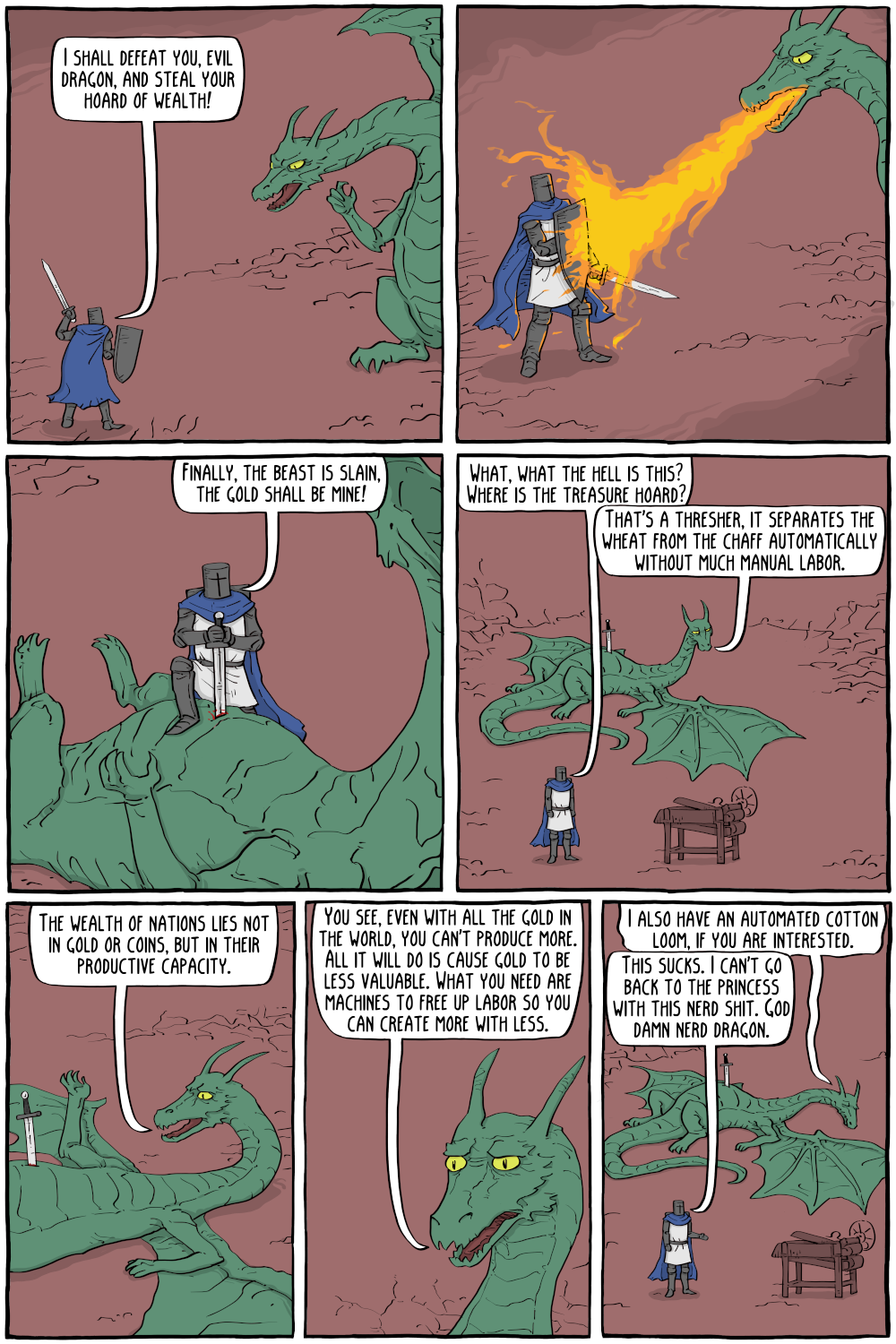Here’s the original for a better quality

Thank you. I edited the post with the new image but I’m not sure it will federate well
Wow, this one actually had me intrigued. So much that I read the whole text below (which is also well written and deserves attention):
The Cotton Looms get all the press in the early industrial revolution, but the Threshing Machine really might be the biggest jump in productive capacity in the history of the world. It cut out so much manual labor (people used to have to bash flails against the grain for hours and hours to separate the seeds) that there were riots all over because it caused so much unemployment and social upheaval. The famous Luddites, who people think of as being opposed to all technology, were mostly mad about automated cotton looms, and their consequences on society. They even went so far as destroying the looms (and other similar movements destroyed threshing machines). They weren’t just backwards thinking technology haters though, but rational people who noticed that there was something deeply wrong with how society was organized that a machine which improved efficiency so much was causing poverty and even starvation among the very workers who it should have benefited. It wasn’t the Luddites who were irrational, but the structure of society itself. After all it should be the people doing back breaking work who are most happy about a machine replacing them, but because all efficiency gains go to the owners, those people are simply out of a job. We’ve seen this time and time again under capitalism, and is even going on right now with AI.
The dragon is based on Adam Smith, who noticed these kind of improvements in production were the key to increasing the wealth of a given society, and that reorganization of society from feudal lords, who largely spent their money on luxuries, to industrial capitalists, who spent a lot of their money on “research and development”, i.e. improving the efficiency of their factories, was causing economic growth and ever increasing wealth. In order to modernize, societies essentially had to get rid of the feudal lords put all of their money into the hands of capitalists as much as possible, to kick start this kind of economic growth.
Without the comic I might never have bothered to read the text though. In that sense it’s very well made.
One theory says gold currency was invented for military campaigns. Kings of old didn’t need currency as they could just demand someone give or make them what they wanted, including mining for more gold. But soldiers need food, so a serious campaign means a lot of logistics. Or you could give them gold so they could buy stuff. And to make sure there is enough gold and people actually want to sell stuff the king imposes taxes.
Graeber and Wengrow also suggest this is the origin of marketplaces. People had always traded, and would often hold regular festivals or holidays where merchants would gather to exchange goods.
But the permanent armies of sovereigns require upkeep. So it isn’t just that you do taxes and create a gold economy, that’s the seed step. Then local producers are “gently coerced” into bringing their goods to market regularly so the armies can supply from them.
In a sense, capitalism and policing arise from ever more efficient configurations through iterations of this cycle.
IIRC an aspect of this is that earlier forms of trade and currency were more tied up in the personal relationships between the people trading and their culture, which makes for an impractical environment for a foreign mercenary with no local familiarity or trust to do business, hence the terrible power of gold’s fungibility.
So, no-one is going to say by automation, one person can feed 10,000, clothe 1000, house 100. Not even 1 ‘man’ can support a family like in the 1950s. What’s gone wrong ? What’s the damn problem, sir?
Capitalism and concentration of wealth, not automation.
Yeah, the issue is that already-rich business owners own all the automation and are scooping the profits of the increased productivity.
Looping back to feudal lords spending their money mostly on luxury goods.
Apparently I agree, congrats (look after me dog).
Average productivity and salary were pretty closely tied up until around 1978. Since then productivity has continued to skyrocket but salary has remained stagnant.
1 man can feed 10,000 families after automation, but capitalism has taken away the extra 9,999 families worth of wealth, and the working class is now back to square 1.
Agree, plz help.
Printing press? Fuck off, reading is for squires
Excellent - thanks OP
One of the first web comics I’ve seen in years that actually made me laugh. Bravo
This made me chuckle, thanks!
Very good!
This gave me a guffaw.










